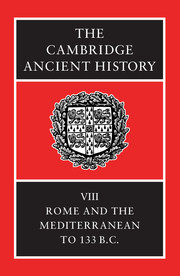Book contents
- Frontmatter
- Contents
- List of maps
- List of text-figures
- Preface
- 1 Sources
- 2 The Carthaginians in Spain
- 3 The Second Punic War
- 4 Rome and Greece to 205 B.C.
- 5 Roman expansion in the west
- 6 Roman government and politics, 200-134 B.C.
- 7 Rome and Italy in the second century B.C.
- 8 Rome against Philip and Antiochus
- 9 Rome, the fall of Macedon and the sack of Corinth
- 10 The Seleucids and their rivals
- 11 The Greeks of Bactria and India
- 12 Roman tradition and the Greek world
- 13 The transformation of Italy, 300 – 133 B.C. The evidence of archaeology
- Three Hellenistic Dynasties
- Genealogical Tables
- Chronological Table
- BIBLIOGRAPHY
- Index
- Map 11: Greece and Asia Minor
- Map 13: Asia Minor and Syria
- References
6 - Roman government and politics, 200-134 B.C.
Published online by Cambridge University Press: 28 March 2008
- Frontmatter
- Contents
- List of maps
- List of text-figures
- Preface
- 1 Sources
- 2 The Carthaginians in Spain
- 3 The Second Punic War
- 4 Rome and Greece to 205 B.C.
- 5 Roman expansion in the west
- 6 Roman government and politics, 200-134 B.C.
- 7 Rome and Italy in the second century B.C.
- 8 Rome against Philip and Antiochus
- 9 Rome, the fall of Macedon and the sack of Corinth
- 10 The Seleucids and their rivals
- 11 The Greeks of Bactria and India
- 12 Roman tradition and the Greek world
- 13 The transformation of Italy, 300 – 133 B.C. The evidence of archaeology
- Three Hellenistic Dynasties
- Genealogical Tables
- Chronological Table
- BIBLIOGRAPHY
- Index
- Map 11: Greece and Asia Minor
- Map 13: Asia Minor and Syria
- References
Summary
THE CONSTITUTIONAL SETTING
The constitutional arrangements with which Rome emerged from the Second Punic War differed scarcely at all in form from those with which she had embarked upon that great struggle. Their essence remained the threefold structure of magistrates, Senate, and assemblies of the citizen body, the structure which the Greek observer Polybius was shortly to characterize as a ‘mixed’ constitution. Of the magistrates the most senior and powerful were the two consuls. Invested with imperium, consuls could be placed in command of armies; they could exercise jurisdiction; they could issue instructions, particular or general, in the form of edicts, and could employ coercion and punishment to enforce their will. They could propose legislation to the assemblies; one of them conducted most of the meetings at which magistrates, including their own successors, were elected; and when one or both were in Rome it was normally a consul who presided over the deliberations of the Senate and gave effect to its most important decisions. On the other hand they were elected officials, the term of their office was limited to one year, early re-election was not permitted, and in various directions their freedom of action was restricted by the powers and authority of other bodies.
All magistrates were elected by the citizen body – consuls, praetors and censors in the comitia centuriata (the assembly organized into 193 voting-units known as centuries), the remainder in the comitia tributa or the almost identical concilium plebis (in which the voting units were the thirty-five tribes, in one of which every Roman citizen was registered). Declarations of war and ratification of treaties were matters for the approval of the comitia centuriata; legislation could be enacted only by vote of the citizen body, the populus, usually in the more convenient procedure of the tribal assembly; and both forms of assembly – but usually the tribal – might be used for major judicial hearings, especially when it was proposed to inflict a penalty on a major public figure.
Keywords
- Type
- Chapter
- Information
- The Cambridge Ancient History , pp. 163 - 196Publisher: Cambridge University PressPrint publication year: 1989
References
- 7
- Cited by



